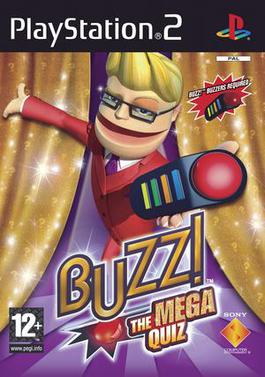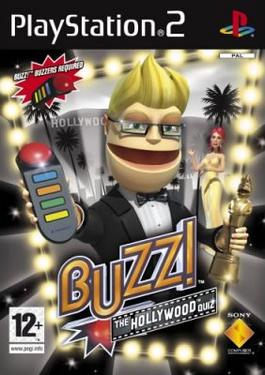
Winning Lines was a National Lottery game show that was broadcast on BBC One from 12 June 1999 to 6 November 2004. It was originally hosted by Simon Mayo and then by Phillip Schofield.
Idiot Savants is an American television game show on the MTV network which ran from December 9, 1996, to April 25, 1997. It was created by Michael Dugan and Chris Kreski, directed by Steve Paley, and hosted by comedian Greg Fitzsimmons.

Street Smarts is an American game show that featured two in-studio contestants trying to predict the outcome of interviews of people who were found on the street. The show, which was hosted by Frank Nicotero, aired in syndication from 2000 to 2005. Nicotero would be on locale with the on the street contestants, virtually any and everywhere in the United States. The in studio gameplay however, was at G4 and TMZ, headquarters, Victory Studios, in Glendale, California.

Stump the Schwab is an American game show that aired on ESPN2 and ESPN Classic from July 8, 2004 to September 29, 2006. The show featured three contestants trying to defeat Howie Schwab, ESPN's first statistician, in a sports trivia contest. Stuart Scott was the show's host. The show also appeared on Canada's The Score Television Network.
Going for Gold is a British television game show that originally aired on BBC1 between 12 October 1987 and 9 July 1996. It was revived for Channel 5 from 13 October 2008 to 20 March 2009.
It's Academic is an Australian children's game show which is based on the long-running American version of It's Academic, and pits students from different schools against each other in a test of knowledge covering a number of diverse subjects including English, mathematics, science, geography, sport, music and popular culture.

Miljoenenjacht, officially Postcode Loterij Miljoenenjacht, is a Dutch game show, sponsored by the country's postcode lottery, where a contestant and at-home viewer could win up to €5,000,000 or as little as €0.01. The show is broadcast at various times, spanning across six episodes for each set. The program was originally shown by TROS on NPO 2, but moved to creator John de Mol's channel Tien in 2005. After the channel was discontinued after its sale to the RTL Group, the program moved to RTL 4. In 2019, the program moved to SBS6 due to the transfer of Linda de Mol from RTL to SBS.
Blokken (Blocks) is a Belgian quiz show based on the video game Tetris. It is broadcast on VRT 1 and hosted by Belgian television personality Ben Crabbé. The show is the longest running quiz show on Belgian television, with 22 seasons. On 10 December 2017 the show aired its 5000th episode.
Counterpoint is a BBC Radio 4 quiz. Described in the show's introduction as "The general knowledge music quiz", the questions are about music, from classical, jazz, pop, musicals, and all other forms of music. It was originally hosted by Ned Sherrin (1986–2006). In the chair for the 2007 series was Edward Seckerson with Paul Gambaccini taking over in 2008, following the death of Ned Sherrin in 2007. Russell Davies took over temporarily in 2013 following allegations made against Gambaccini, who returned to the show in November 2014 after being cleared of the allegations.
You Bet Your Ass is a Canadian game show that aired on The Comedy Network. It followed a blackjack and casino motif, with contestants answering questions on popular culture to earn points. The contestant with the most points at the end of the show was the winner.

Buzz!: The Mega Quiz, released as Buzz! The Maha Quiz in India, was developed by Relentless Software and is the fourth game in the Buzz! series for the PlayStation 2, alongside Buzz! Junior: Robo Jam. Buzz! The Mega Quiz has over 5,000 questions. Along with Buzz! Junior: Jungle Party, this was one of the first Buzz games released in North America, also the first game in the series to have a 12+ rating by PEGI.

Buzz!: The Hollywood Quiz is the fifth installment in the Buzz! series of video games developed for the PlayStation 2 by Relentless Software. Players have to answer questions asked by the quiz master using the four Buzz! remote controls.
Sports Geniuses is an American sports-themed game show that aired for 65 episodes from March 27, 2000, until June 23, 2000, on cable channel Fox Sports Net. It was the network's second game show. The advertising campaign for the show won a Clio Award.

Buzz!: Quiz World, developed by Relentless Software, is the ninth game in the Buzz! series of quiz games. The game is available for PlayStation 3 and PlayStation Portable consoles. It allows users to use question packs purchased for previous Buzz! games as well as supporting user created content and online play. Unlike the previous PSP Buzz!, Buzz: Quiz World (PSP) supports DLC. As with all previous Buzz games the game is available in a game only (Solus) version or in a bundle which includes 4 wireless Buzz! Buzzers and a USB dongle for wireless connectivity.
20Q is an American game show based on the online artificial intelligence and handheld computer game of the same name. Licensed to and produced by Endemol USA, it premiered on June 13, 2009, during Big Saturday Night airing on GSN, and is hosted by Cat Deeley of So You Think You Can Dance with the voice of Mr. Q provided by Hal Sparks.
The 3rd Degree is a British quiz show broadcast on BBC Radio 4, hosted by comedian Steve Punt and made by Pozzitive Television. The series is recorded at different universities around the country, the contestants all coming from the university in which the recording takes place. One team consists of three students and the other of three lecturers who teach the subjects the students are studying.

Winsanity is an American television game show broadcast by Game Show Network (GSN). The series, hosted by Donald Faison, premiered June 9, 2016.

Impossible is a British television quiz show created by Hugh Rycroft and produced by Mighty Productions for BBC One. Hosted by Rick Edwards, the show has a maximum prize of £10,000 and features questions in which some answer choices are "impossible" or inconsistent with the given category.

Common Knowledge is an American television game show hosted by Joey Fatone that aired on Game Show Network from January 14, 2019 to August 13, 2021. On April 17, 2019, media reports stated that GSN had renewed the show for a 130-episode second season. On March 25, 2021, GSN renewed the show for a third season, which premiered on May 17, 2021.

Master Minds is an American game show airing on the Game Show Network. The show debuted on June 10, 2019, under the title Best Ever Trivia Show, hosted by Sherri Shepherd and regularly featuring Ken Jennings, Muffy Marracco, Jonathan Corbblah, Arianna Haut, and Ryan Chaffee. The series was renamed Master Minds on April 6, 2020, with Brooke Burns replacing Shepherd.











